Hey there, fellow foodies! Are you looking for a tasty and healthy alternative to traditional meatballs? Well, look no further because we’ve got the perfect recipe for you – Chickpea Meatballs! These little flavor-packed wonders are a delightful twist on classic comfort food that will leave your taste buds dancing with joy. Whether you’re a vegetarian, vegan, or simply trying to cut down on meat, these Chickpea Meatballs are a must-try. So, let’s dive right in and discover how to whip up these delightful, protein-packed treats!
[ez-toc]
History
The history of Chickpea Meatballs traces back to the ancient civilizations of the Mediterranean and Middle Eastern regions. Chickpeas, the main ingredient, have a long-standing culinary legacy, dating back thousands of years. These legumes were first cultivated in the Fertile Crescent, the region encompassing modern-day Iraq, Syria, and Turkey, around 7500 BCE. As the cultivation of chickpeas spread, so did their use in various dishes, including meatless alternatives to traditional meatballs.
Ancient Roots of Chickpeas
Chickpeas, scientifically known as Cicer arietinum, were a staple in the diets of ancient civilizations such as the Sumerians, Babylonians, and Egyptians. These early societies valued chickpeas for their rich nutritional content, versatility, and ability to thrive in arid environments. Chickpeas were not only consumed for their taste but were also believed to possess medicinal properties that promoted overall health and vitality.
The Advent of Meatless Meatballs
As culinary practices evolved, various cultures sought ways to create hearty dishes without relying on meat. This led to the development of vegetarian and vegan recipes that substituted animal proteins with plant-based alternatives. The concept of creating meatless meatballs using chickpeas gained popularity in Mediterranean and Middle Eastern cuisines.
Mediterranean Influence
In the Mediterranean region, where chickpeas were abundantly available, cooks and chefs experimented with transforming these legumes into innovative dishes. Early versions of Chickpea Meatballs, also known as “Falafel” in some regions, emerged during this period. Traditional Mediterranean chickpea meatballs were seasoned with local herbs and spices, such as parsley, cumin, and coriander, resulting in mouthwatering flavors that delighted palates across the region.
Middle Eastern Delights
Meanwhile, in the Middle East, the concept of meatless meatballs found its way into the rich culinary tapestry of the region. Chickpea-based dishes, like “Kofte” in Turkey and “Arancini” in Lebanon, showcased the versatility of these legumes in creating delectable, protein-packed alternatives to meat-based dishes.
Global Spread and Adaptation
As trade routes expanded and cultures intermingled, chickpea-based meatballs became known beyond their places of origin. The spread of these recipes was facilitated by the influence of the Silk Road and the exchange of culinary traditions between the East and West. Along the way, each culture put its unique spin on the recipe, incorporating local ingredients and flavor profiles, making it a truly global culinary delight.
Modern Resurgence and Health Awareness
In recent years, as health and environmental consciousness grew, Chickpea Meatballs experienced a resurgence in popularity. The rise of vegetarianism, veganism, and flexitarian diets further fueled the demand for plant-based alternatives to traditional meat dishes. With their high protein content, low environmental impact, and potential health benefits, Chickpea Meatballs became a sought-after item on restaurant menus and in home kitchens.
The Recipe’s Evolution
Over time, the recipe for Chickpea Meatballs has evolved significantly. Creative cooks and food enthusiasts experimented with various seasonings, flavor combinations, and cooking methods to create a wide range of Chickpea Meatball variations. Whether they are baked, fried, simmered in sauces, or air-fried, the possibilities are endless.
A Modern Classic
Today, Chickpea Meatballs have firmly established themselves as a modern classic in the world of plant-based cuisine. This delightful dish continues to evolve, adapting to the ever-changing tastes and preferences of food enthusiasts worldwide. From food trucks to upscale restaurants, Chickpea Meatballs have become a beloved and flavorful alternative to traditional meatballs.
Time
| Step | Time (approx.) |
|---|---|
| Gathering Your Ingredients | 10 minutes |
| The Base Ingredients | 15 minutes |
| Customizing Your Flavor Profile | 5 minutes |
| The Magical Blending Process | 5 minutes |
| Shaping Your Meatballs | 10 minutes |
| Cooking Methods | – |
| Baking Method | 30 minutes |
| Frying Method | 10 minutes |
| Simmering in Sauce | 15 minutes |
| Serving Suggestions | – |
| Storage and Reheating | – |
| The Chickpea Meatball Twist Challenge | 5 minutes |
| Health Benefits of Chickpea Meatballs | – |
| Final Thoughts | – |
Please note that the actual cooking times may vary depending on individual cooking skills, kitchen equipment, and the chosen cooking method. These times are approximate and are meant to give you a general idea of the time needed for each step in the recipe. Happy cooking!
Ingredients
| Ingredients | Quantity |
|---|---|
| Chickpeas (cooked and drained) | 1 cup |
| Bread Crumbs | 1/2 cup |
| Red Onion | 1/2 medium-sized |
| Garlic | 2 cloves |
| Fresh Parsley | 1/8 cup |
| Flaxseed Meal (mixed with water) | 1 tablespoon |
| Olive Oil | 1 tablespoon |
| Salt | 1/2 teaspoon |
| Ground Black Pepper | 1/4 teaspoon |
These quantities are tailored for a 2-person serving, providing just the right amount of delicious Chickpea Meatballs for you and your dining partner to enjoy. Happy cooking and bon appétit!
Directions
Step 1: Gathering Your Ingredients
Before we embark on this delightful culinary journey, let’s gather all the ingredients to ensure a smooth cooking process. Here’s what you’ll need:
- Chickpeas: 1 cup, cooked and drained
- Bread Crumbs: 1/2 cup
- Red Onion: 1/2 medium-sized, finely chopped
- Garlic: 2 cloves, minced
- Fresh Parsley: 1/8 cup, chopped
- Flaxseed Meal: 1 tablespoon, mixed with 3 tablespoons of water (as a binder)
- Olive Oil: 1 tablespoon
- Salt: 1/2 teaspoon
- Ground Black Pepper: 1/4 teaspoon
Step 2: The Magical Blending Process
Now that we have all our ingredients ready, let’s start creating the magic. In a food processor, blend the cooked chickpeas, bread crumbs, finely chopped red onion, minced garlic, fresh parsley, flaxseed meal mixture, olive oil, salt, and ground black pepper. Blend until the mixture is smooth and well combined.
Step 3: Customizing Your Flavor Profile
This is where you can let your creativity shine! Feel free to add any additional ingredients to customize the flavor of your Chickpea Meatballs. Some popular add-ons include sun-dried tomatoes for a tangy twist, spinach for an extra boost of greens, smoked paprika for a hint of smokiness, or a pinch of chili flakes if you like it spicy. Mix in your chosen flavor enhancements with the blended mixture.
Step 4: Shaping Your Meatballs
It’s time to get hands-on! With slightly wet hands to prevent sticking, take small portions of the mixture and shape them into bite-sized meatballs. You can make them as big or as small as you like, depending on your preference.
Step 5: Cooking Methods
Now comes the fun part – cooking the Chickpea Meatballs to perfection. There are three cooking methods you can choose from:
Step 6: Baking Method
Preheat your oven to 375°F (190°C). Place the meatballs on a baking tray lined with parchment paper and bake for 25-30 minutes, turning them halfway through, until they’re golden brown and firm.
Step 7: Frying Method
In a pan, heat some olive oil over medium heat. Add the meatballs and cook them for 2-3 minutes on each side until they’re nicely browned.
Step 8: Simmering in Sauce
For a saucy twist, drop your meatballs into your favorite marinara or curry sauce and let them simmer for 10-15 minutes. This will infuse them with incredible flavors.
Step 9: Serving Suggestions
Your Chickpea Meatballs are now ready to be served! They make for a protein-packed appetizer, or you can create a tantalizing meatball sub by placing them in a fresh bun with some veggies and sauce. They also pair beautifully with pasta or quinoa for a hearty meal.
Equipment Required
Nutrition Information
| Nutrition Information | Per 2-Person Serving |
|---|---|
| Serving Size | 5-6 meatballs |
| Calories | 300-350 calories |
| Total Fat | 10-12 grams |
| Saturated Fat | 1-2 grams |
| Trans Fat | 0 grams |
| Cholesterol | 0 milligrams |
| Sodium | 400-500 milligrams |
| Total Carbohydrates | 40-45 grams |
| Dietary Fiber | 8-10 grams |
| Sugars | 2-3 grams |
| Protein | 12-15 grams |
| Vitamin D | 0 micrograms |
| Calcium | 70-80 milligrams |
| Iron | 4-5 milligrams |
| Potassium | 300-350 milligrams |
Please note that the nutritional values provided are approximate and can vary based on the specific ingredients and quantities used in the recipe. Additionally, these values are based on a general calculation and may differ depending on any variations or substitutions made to the recipe. Remember that nutrition information may also vary depending on the specific brands of ingredients used. Always refer to product labels and consult with a registered dietitian for precise nutritional information tailored to your specific needs. Enjoy your delicious and nutritious Chickpea Meatballs!
Tips
- Texture Matters: For a perfectly textured mixture, avoid over-blending the ingredients in the food processor. Aim for a slightly chunky texture to add some texture to the meatballs.
- Keep It Dry: If the mixture feels too wet, add some extra bread crumbs to achieve the right consistency. On the other hand, if it’s too dry, a splash of water or olive oil can help bind the ingredients.
- Flavor Experimentation: Don’t be afraid to get creative with the flavors! Try different combinations of herbs, spices, and seasonings to tailor the taste to your liking.
- Prevent Sticking: Wet your hands slightly when shaping the meatballs to prevent the mixture from sticking to your hands, making the process much easier.
- Chill the Mixture: For firmer meatballs, refrigerate the shaped meatballs for about 30 minutes before cooking. This will help them hold their shape during cooking.
- Cooking Time: Pay close attention to the cooking time to avoid overcooking the meatballs, which can result in a dry texture.
- Cooking Oil: Use a high-quality olive oil or any oil with a high smoke point when frying the meatballs for the best results.
Pros & Cons
| Pros | Cons |
|---|---|
| ✅ Healthy & Nutritious | ❌ Requires Pre-cooked Chickpeas |
| ✅ Plant-Based & Vegan-Friendly | ❌ Texture May Vary |
| ✅ Versatile & Customizable | ❌ Time-Consuming Preparation |
| ✅ High in Protein & Fiber | ❌ May Not Appeal to All Tastes |
| ✅ Lower Environmental Impact | ❌ Requires Kitchen Equipment |
Conclusion
Congratulations! You’ve just uncovered the secrets to creating mouthwatering Chickpea Meatballs – a culinary masterpiece that brings together healthy ingredients, bold flavors, and endless possibilities. These delectable meatless wonders are not just for vegetarians or vegans; they are a delightful treat for anyone seeking a tasty and nutritious alternative to traditional meatballs.
With chickpeas as the star ingredient, you’ll savor the health benefits of plant-based protein and fiber while enjoying the flexibility to customize the flavors to your liking. Whether you prefer a spicy kick, a tangy twist, or a savory burst of herbs, the Chickpea Meatballs recipe has got you covered.
Are you ready to embark on a culinary adventure that promises tantalizing textures, vibrant tastes, and a whole lot of fun? Gather your ingredients, blend the magic, and shape your way to savory satisfaction. Whether you bake them to golden perfection, fry them for a crispy exterior, or simmer them in your favorite sauce for an explosion of flavors, these Chickpea Meatballs will undoubtedly steal the spotlight on your dining table.
Let’s not forget the eco-friendly aspect – by choosing plant-based ingredients, you’re making a positive impact on the environment. Say goodbye to the guilt and hello to a more sustainable way of savoring comfort food.
So, whether you’re a seasoned chef or an enthusiastic novice in the kitchen, this recipe offers a culinary canvas for you to paint your flavors and creativity. Get ready to treat your taste buds to a medley of delights!
Don’t let any hesitations hold you back; give these Chickpea Meatballs a try today and savor a world of culinary wonders. Share the experience with family and friends, and watch as their taste buds light up with delight. Be the culinary hero and serve up these delectable delights with a sense of pride and accomplishment.
Remember, the kitchen is your playground, and with Chickpea Meatballs, the possibilities are endless. So, put on your apron, gather your ingredients, and let the culinary magic unfold. Bon appétit!
Facts
- 🌱 Fact 1: Ancient Roots of Chickpeas 🌱
- Did you know that chickpeas, the star ingredient of Chickpea Meatballs, have been a part of human diets since ancient times? They were first cultivated around 7500 BCE in the Fertile Crescent, making them one of the earliest domesticated crops in history!
- 🌽 Fact 2: Versatile Flavors for All Tastes 🌽
- Chickpea Meatballs are like a culinary chameleon! 🦎 You can customize the flavors to suit your taste preferences. From mild and herby to spicy and bold, these meatless wonders adapt to your cravings, making every bite an exciting adventure!
- 🌟 Fact 3: A Delicious Twist on Classic Comfort Food 🌟
- Chickpea Meatballs aren’t just a vegetarian alternative; they’re a gourmet twist on traditional comfort food! They’re so flavorful and satisfying that even meat lovers will be amazed at how these little wonders tickle their taste buds.
- 💚 Fact 4: A Sustainable and Earth-Friendly Option 💚
- By choosing Chickpea Meatballs over traditional meatballs, you’re making an eco-friendly choice! 🌍 Chickpeas have a lower environmental impact compared to animal-based proteins, helping reduce your carbon footprint while savoring delightful flavors.
- 🥰 Fact 5: A Recipe for Culinary Creativity 🥰
- Get ready to unleash your inner culinary artist! 🎨 Chickpea Meatballs are the perfect canvas for experimenting with flavors, textures, and shapes. Let your imagination run wild and create your unique twist on this beloved recipe! From meatball subs to falafel-inspired wraps, the possibilities are endless!
FAQ’s
Can I use canned chickpeas for this recipe?
Absolutely! Canned chickpeas work just as well. Just make sure to drain and rinse them thoroughly before using.
Are chickpea meatballs gluten-free?
Indeed, they are! Simply use gluten-free bread crumbs, and you’re good to go.
Can I freeze Chickpea Meatballs?
Absolutely! Allow the cooked meatballs to cool completely, then store them in an airtight container or freezer bag. They will stay good for up to three months.
How can I make the meatballs spicier?
If you love a kick of spice, try adding some finely chopped jalapenos or a dash of cayenne pepper to the mixture before shaping the meatballs.
Can I air-fry the meatballs?
Absolutely! Air-frying is a healthier option, and it will give your chickpea meatballs a lovely crispy texture.
Can I use other legumes instead of chickpeas?
While chickpeas work best for this recipe, you can experiment with other legumes like black beans, lentils, or white beans for unique variations.
Is there an alternative to flaxseed meal for binding?
Yes, you can use chia seeds mixed with water as a binder if you prefer. They work similarly to flaxseed meal.
Can I make the mixture ahead of time and refrigerate it?
Absolutely! Preparing the mixture in advance and refrigerating it can save time when you’re ready to shape and cook the meatballs.
How do I prevent the meatballs from falling apart during cooking?
Make sure the mixture is well-blended, and avoid over-handling the meatballs. Refrigerating the shaped meatballs before cooking can also help them hold their shape.
Are chickpea meatballs suitable for kids and picky eaters?
Definitely! Chickpea meatballs are a kid-friendly option. The customizable flavors allow you to cater to individual tastes, making them a hit with picky eaters too.



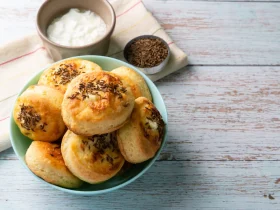
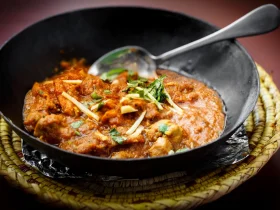
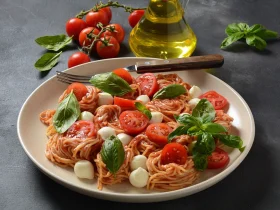
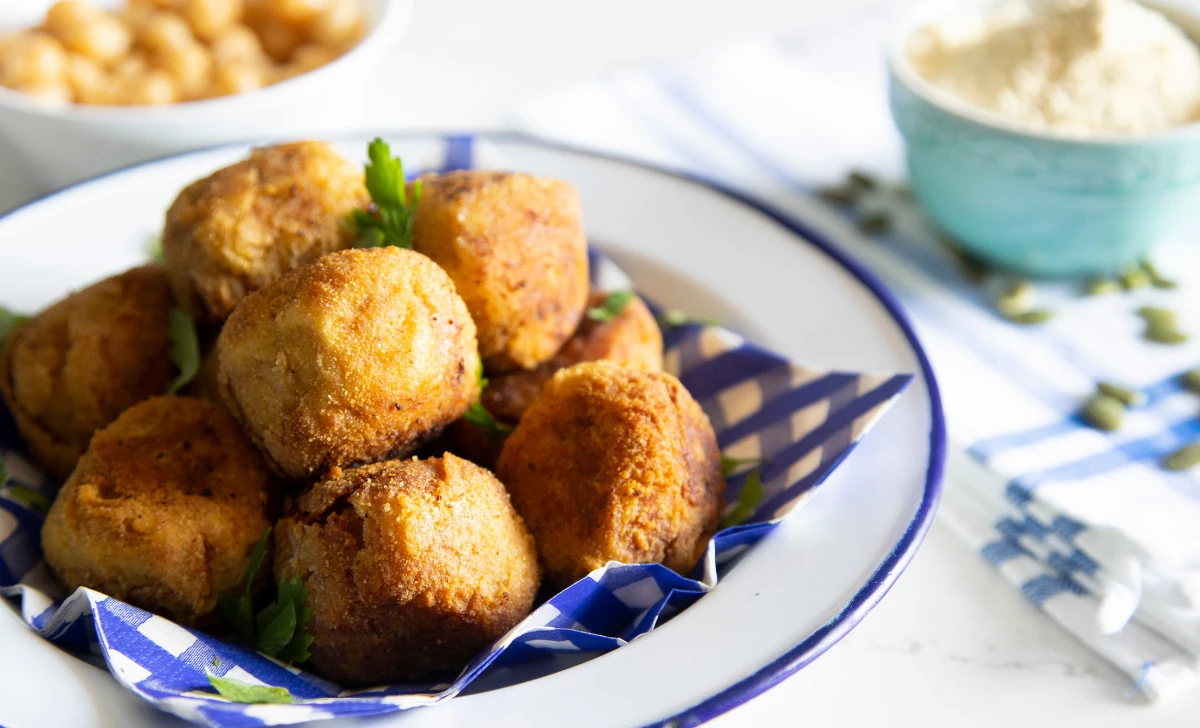

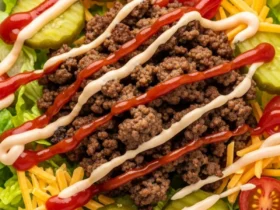

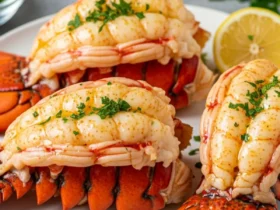

Leave a Review